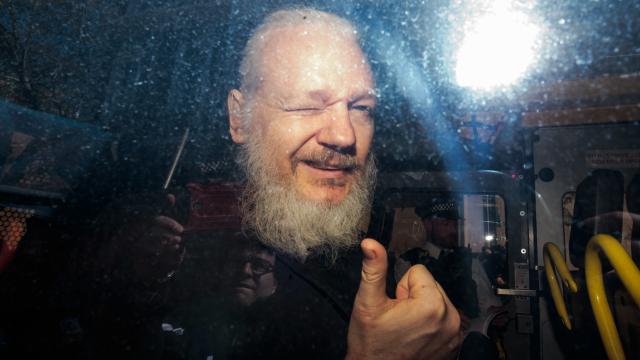On Friday, a lawyer representing Julian Assange in his ongoing UK extradition trial testified that she was present when a former Republican congressman visited the WikiLeaks founder in 2017 to dangle a potential pardon from U.S. President Trump in exchange for identifying the source of the leaked documents from the DNC that were distributed by WikiLeaks during the 2016 election.
Assange is involved in so many different legal matters over the last 10 years, it’s easy to lose track of which one is being discussed at any given moment. Currently, he’s fighting a request from the U.S. Department of Justice to extradite him stateside so he can be charged with various hacking and conspiracy crimes related to his disclosure of thousands of U.S. government documents in 2010 and 2011. This is not the same set of charges that kept Assange holed-up in the London Ecuadorian embassy for almost seven years, but he has argued for years that leaving the embassy would expose him to extradition and political prosecution when his work should be considered no different than that of a journalist from the New York Times.
That’s where the pardon comes in. Assange’s defence maintains that the U.S. indictment is a purely political effort. As one piece of evidence to that end, it’s offering the story of the time that then-U.S. Representative Dana Rohrabacher visited Assange at the embassy in 2017. According to Reuters, Assange’s lawyer, Jennifer Robinson, testified in a London courtroom this morning that she was present at the meeting between Assange, Rohrabacher, and the Holocaust-denying political troll Chuck Johnson.
According to quotes reported by the Guardian, she explained that on August 15, 2017, the congressman and Johnson presented themselves as being there on behalf of President Trump. “They stated that President Trump was aware of and had approved of them coming to meet with Mr. Assange to discuss a proposal — and that they would have an audience with the president to discuss the matter on their return to Washington, DC,” she said.
In her own words, Robinson claimed:
Congressman Rohrabacher explained he wanted to resolve the ongoing speculation about Russian involvement in the Democratic National Committee leaks to WikiLeaks, which were published by WikiLeaks and other media organisations in 2016.
He stated that he regarded the ongoing speculation as damaging to US-Russian relations, that it was reviving cold war politics, and that it would be in the best interests of the U.S. if the matter could be resolved.
He and Mr. Johnson also explained that any information from Mr. Assange about the source of the DNC leaks would be of interest, value, and assistance to Mr. Trump.
The meeting was concluded on the basis that Congressman Rohrabacher would return to have a direct conversation with President Trump about exactly what would be done to prevent Mr. Assange’s indictment and extradition.
For the record, Robinson said that Assange did not reveal his sources. In 2018, the U.S. Justice Department indicted 12 Russian intelligence officers accusing them of being behind the DNC leak. Assange has maintained that he did not work with the Russian government in the course of distributing the material.
The Assange legal team said in February that this would be one key facet of their defence, but this is the first time that Robinson has told her story to the court on the record. While we heard new details about the incident, the most surprising thing about today’s hearing was the U.S. decided not to dispute Robinson’s testimony. A lawyer representing the U.S. in the case said, “The position of the government is we don’t contest these things were said. We obviously do not accept the truth of what was said by others.”
Some outlets have taken this as the U.S. government admitting that the basic outline of Robinson’s story is true while leaving the truth of the President’s involvement up in the air. Unfortunately, we’re not really any closer to resolving exactly what happened. The U.S. just isn’t arguing the matter.
The Wall Street Journal first reported on the meeting back in 2017, and there’s photographic evidence of Rohrabacher and Johnson being at the embassy. In 2017, Rohrabacher cheerfully admitted going on the mission to work out a deal and said that he had been in communication with “senior people at the White House” including now-former White House Chief of Staff General John Kelly, but he hasn’t publicly discussed what was on offer. In February of this year, Rohrabacher went a bit further saying:
At no time did I offer Julian Assange anything from the president because I had not spoken with the president about this issue at all. However, when speaking with Julian Assange, I told him that if he could provide me information and evidence about who actually gave him the DNC emails, I would then call on President Trump to pardon him.
The episode is intended to demonstrate that the U.S. has an opportunistic attitude when it comes to its treatment of Assange and that everything is negotiable if Assange is willing to bend to the whims of whatever administration happens to be prosecuting him. We may not ever find out exactly what happened in that meeting, but the U.S. decision not to call on Rohrabacher to testify could be good for Assange’s chances at trial.
